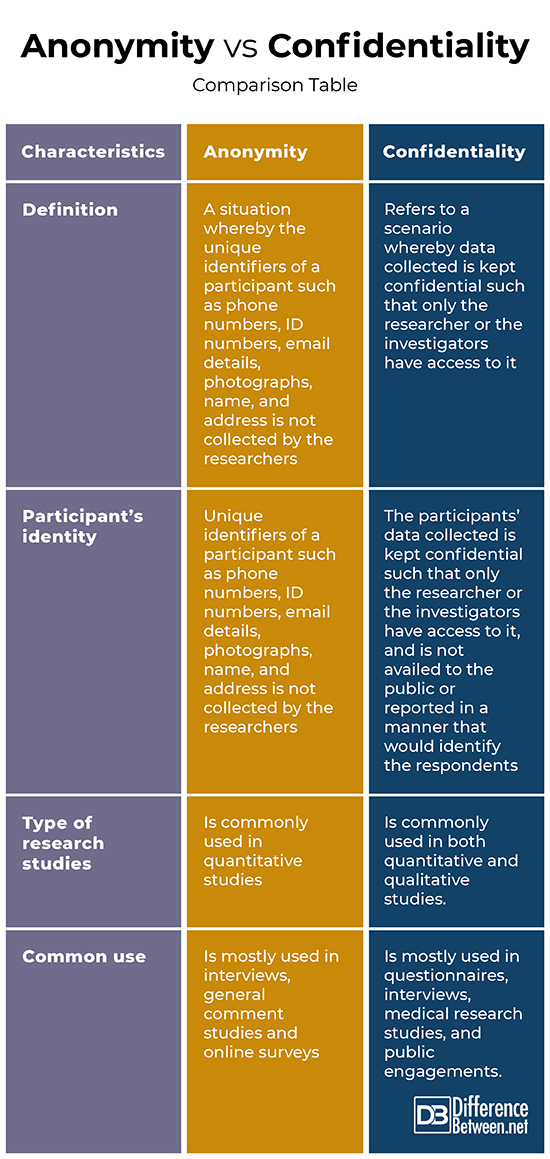Difference Between Anonymity and Confidentiality
The protection of information is vital in many aspects of life. For instance, surveys and research activities in medical, religious, political, just to name a few, may require strict anonymity and confidentiality measures put in place. Participants engaging in research studies, medical testing or public engagement may want to preserve their identities. This can be done through privacy, anonymity or confidentiality agreements. Understanding these terms is critical for both the interviewers as well as the participants of any of these activities.
What is Anonymity?
This is a situation whereby the unique identifiers of a participant such as phone numbers, ID numbers, email details, photographs, name, and address is not collected by the researchers. The data collected should not have any identifiers that would allow identification of an individual when combined. For instance, while age alone is not a unique identifier, the combination of factors such as gender, demographics, age, community and specific studies may easily lead to the identification of a participant.
What is Confidentiality?
Confidentiality refers to a scenario whereby data collected is kept confidential such that only the researcher or the investigators has access to it. The specific data identifiers are hence, not availed to the public, and is not reported in a manner that would identify the respondents. Participant’s personal information such as name, date of birth, location and contact info may be collected. To ensure confidentiality, the researcher should hence take measures such as password protection, encryption and even ensuring any hardcopies is securely locked into file cabinets.
Similarities between Anonymity and Confidentiality
- Both are important terms in data collection and research
- Both work towards safeguarding the personal information of participants
Differences between Anonymity and Confidentiality
Definition
Anonymity is a situation whereby the unique identifiers of a participant such as a phone number, ID numbers, email details, photographs, name, and address is not collected by the researchers. On the other hand, confidentiality refers to a scenario whereby data collected is kept confidential such that only the researcher or the investigators have access to it.
Participants identity
In anonymity, unique identifiers of a participant such as phone numbers, ID numbers, email details, photographs, name, and address is not collected by the researchers. On the contrary, in confidentiality, the participants’ data collected is kept confidential such that only the researcher or the investigators have access to it, and is not availed to the public or reported in a manner that would identify the respondents.
Type of research studies
While anonymity is commonly used in quantitative studies, confidentiality is commonly used in both quantitative and qualitative studies.
Common use
While anonymity is commonly used in interviews, general comment studies and online surveys, confidentiality is commonly used in questionnaires, interviews, medical research studies, and public engagements.
Anonymity vs. Confidentiality: Comparison Table
Summary of Anonymity vs. Confidentiality
The knowledge of anonymity and confidentiality must be emphasized, especially to persons engaged in research activities. While anonymity refers to a situation whereby the unique identifiers of a participant such as phone numbers, ID numbers, email details, photographs, name, and address is not collected by the researchers, confidentiality refers to a scenario whereby data collected is kept confidential such that only the researcher or the investigators have access to it.
- Difference Between Profit Center and Investment Center - July 2, 2022
- Difference Between Anti-Trust and Anti-Competition - June 6, 2022
- Difference Between Stocktaking and Stock Control - June 6, 2022
Search DifferenceBetween.net :
Leave a Response
References :
[0]Image credit: https://commons.wikimedia.org/wiki/File:Deinviduation_model_.jpg
[1]Image credit: http://www.thebluediamondgallery.com/highlighted/c/confidential.html
[2]Drennan J & Curtis E. Quantitative Health Research: Issues and Methods. McGraw-Hill Education (UK), 2013. https://books.google.co.ke/books?id=FWJFBgAAQBAJ&pg=PA98&dq=Difference+between+anonymity+and+confidentiality&hl=en&sa=X&ved=0ahUKEwih28Gz0dbhAhVD1BoKHYUKDaYQ6AEIPzAE#v=onepage&q=Difference%20between%20anonymity%20and%20confidentiality&f=false
[3]Chronister L & Kulakowski E. Research Administration and Management. Jones & Bartlett Publishers, 2008. https://books.google.co.ke/books?id=CXt9wviBr2kC&pg=PA546&dq=Difference+between+anonymity+and+confidentiality&hl=en&sa=X&ved=0ahUKEwih28Gz0dbhAhVD1BoKHYUKDaYQ6AEISjAG#v=onepage&q=Difference%20between%20anonymity%20and%20confidentiality&f=false
[4]Beins B. Successful Research Projects: A Step-by-Step Guide. SAGE Publications, 2013. https://books.google.co.ke/books?id=DaogAQAAQBAJ&pg=PA38&dq=Difference+between+anonymity+and+confidentiality&hl=en&sa=X&ved=0ahUKEwih28Gz0dbhAhVD1BoKHYUKDaYQ6AEIUTAH#v=onepage&q=Difference%20between%20anonymity%20and%20confidentiality&f=false



